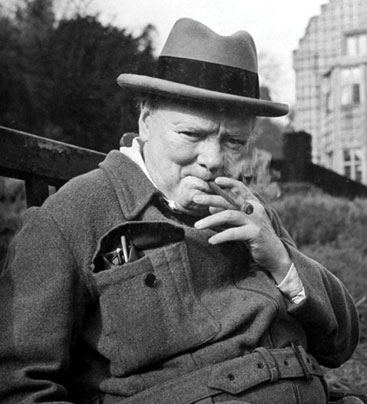CHURCHILL BACK IN BUSINESS, WEEK 4
“You’re not going to write, are you?” This was Winston Churchill’s pointed query to his staff members. His cautionary implication was clear: Not about me.
This rarely spoken but widely apprehended rule was only broken twice in the years before Churchill achieved his postwar celebrity. The first time was by a man — his bodyguard, Detective-Inspector Walter H. Thompson. The second time was by a woman — a secretary named Phyllis Moir. Only one of these breaches was excused.
We look to the unexcused next, as we continue to explore the veritable handful of Churchill memoirs written by women.
 In December 1931, Winston Churchill sailed to America for a forty-lecture tour booked to recoup some of his massive market “Crash” losses. Traveling with his wife Clementine and daughter Diana, he landed in New York City and immediately began searching for a good secretary to manage his multifarious affairs and take down his ceaseless dictation. Before one could be found, Churchill was famously struck by a car one late evening while crossing Fifth Avenue on his way to the apartment of Bernard Baruch. That he survived the accident was a near-miracle. Upon his release from the hospital weeks later, Phyllis Moir was sent to him for an interview.
In December 1931, Winston Churchill sailed to America for a forty-lecture tour booked to recoup some of his massive market “Crash” losses. Traveling with his wife Clementine and daughter Diana, he landed in New York City and immediately began searching for a good secretary to manage his multifarious affairs and take down his ceaseless dictation. Before one could be found, Churchill was famously struck by a car one late evening while crossing Fifth Avenue on his way to the apartment of Bernard Baruch. That he survived the accident was a near-miracle. Upon his release from the hospital weeks later, Phyllis Moir was sent to him for an interview.
She was British and widely experienced, having worked for a range of luminaries; from Lord Balfour to Lillian Gish. He interviewed her in his suite at the Waldorf and hired her before departing for some R&R in the Bahamas. On his return, Phyllis Moir went to work for Winston Churchill. “I have never worked so hard or so fast in my life,” she would later write.
Moir remained with Churchill until he sailed back to England in March 1932. During her less-than-three months of employment she accompanied him on his resumed lecture tour, typed his voluminous correspondence and memoranda, as well as a series of articles that he wrote about his journeys for the Daily Mail which would earn him £8,000.
She also must have written down quite a few notes for her own use because nine years later, in 1941, Phyllis Moir published a memoir in the U.S. entitled, I Was Winston Churchill’s Private Secretary.
The book is a keenly-observed and fiercely admiring portrait. “My association with Mr. Churchill convinced me that the quality most responsible for the man’s prodigious achievements is his unflagging zest for creative work,” Moir wrote. “He seemed to cast a spell on you that quite reconciles you to his exacting demands on your endurance… I somehow felt that this man had a direct hand in shaping the world’s affairs and that, in a very small way, I was being taken behind the scenes and allowed to share his work. It was exciting and, I must confess, satisfying to the ego.”
Moir detailed Churchill’s methods and manner of working and relaxing, including his preferences in spirits and cigars. She ultimately must have visited him at Chartwell because she writes astutely about his habits there, including the fact that he prepared the dressing for his salads with his own hands in an elaborate ritual that she lingeringly described.
Moir clearly wrote I Was Winston Churchill’s Private Secretary to help promote her old boss as Britain’s new Prime Minister to a still dubious and largely isolationist United States of America. Certainly she succeeded admirably in humanizing him.
Nevertheless, the Churchill family was apparently not pleased with I Was Winston Churchill’s Private Secretary. Moir’s breaching of Churchill’s dictum, “not to write” seems to have come at some cost to her relationship with the family. Her use of a letter of recommendation Churchill had written for her as the frontispiece to her book implied a blessing that Winston Churchill did not actually bestow.
Yet, when Churchill’s bodyguard, Inspector W.H. Thompson, published his first Churchill memoir, Guard from the Yard in 1938 (he would write two more), Winston Churchill provided an expansive Foreword. “I think he is quite justified in putting down his impressions and recollections of our travels in different countries,” wrote Churchill. Why the double standard? Who can say.
We say to you: Vaccinated good health. Our wish. As ever.


